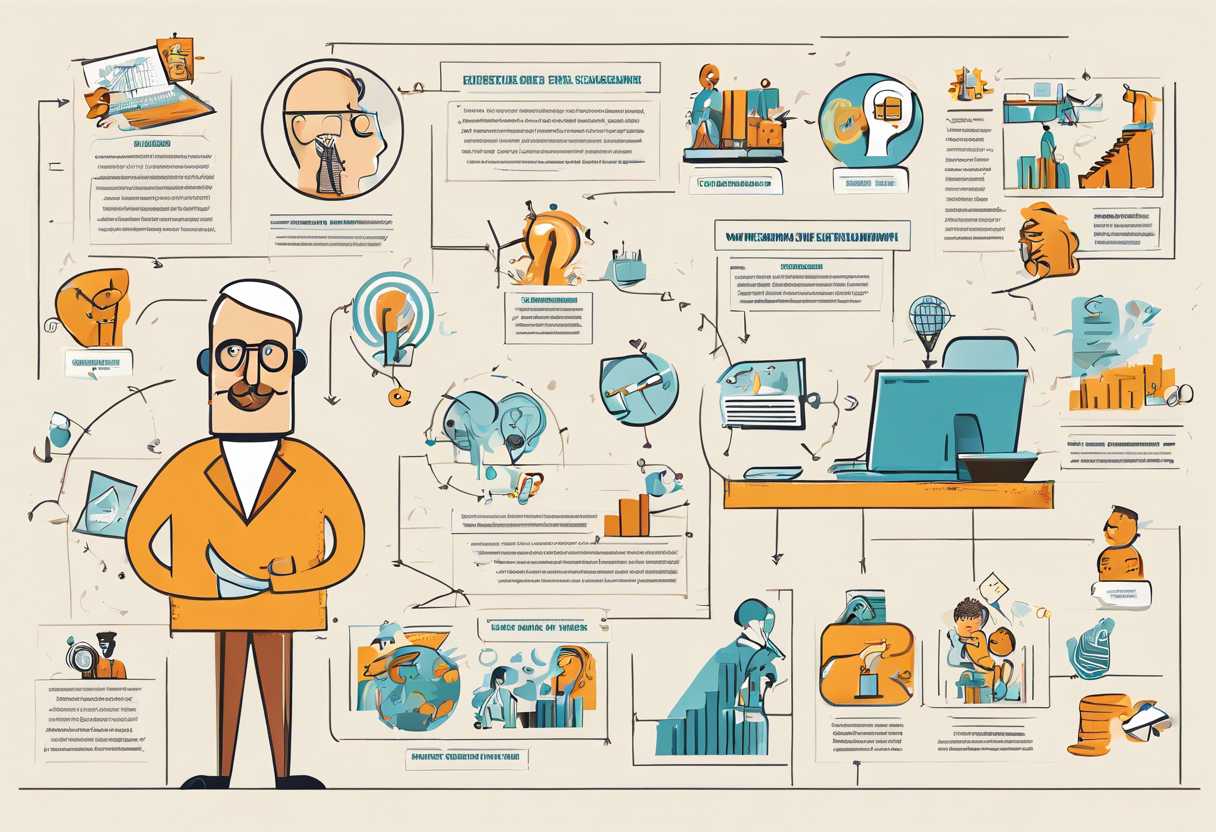Are you looking to drive organizational transformation and enhance team collaboration and productivity within your organization? Look no further than the Agile Coach. In this blog post, we will explore the essential role of The Agile Coach in driving organizational transformation, the key skills and qualities required to be an effective Agile Coach, the impact of The Agile Coach on team collaboration and productivity, as well as the challenges and resistance faced by Agile Coaches and how to navigate them. Additionally, we will delve into the future of Agile Coaching, including emerging trends and opportunities in the industry. Whether you are an aspiring Agile Coach or looking to understand the value of Agile Coaching within your organization, this post will provide valuable insights and guidance.
The Role of The Agile Coach in Driving Organizational Transformation
Understanding the Agile Coach’s Role
An Agile Coach plays a crucial role in driving organizational transformation by guiding teams and leaders through the adoption of agile methodologies. They act as mentors, trainers, and facilitators, helping organizations embrace a culture of continuous improvement and adaptability.
Agile Coaches work closely with teams to identify and address challenges, foster collaboration, and promote a mindset of experimentation and learning.
Key Responsibilities of an Agile Coach
Agile Coaches are responsible for providing guidance and support to teams and leaders as they navigate the complexities of agile transformation. They help in creating a shared understanding of agile principles and practices, and assist in the implementation of agile frameworks such as Scrum or Kanban.
They also facilitate workshops, retrospectives, and other agile ceremonies to promote transparency, accountability, and continuous improvement.
Measuring the Impact of Agile Coaching
Measuring the impact of Agile Coaching is essential for evaluating the success of organizational transformation. This can be done through various metrics such as team velocity, cycle time, and customer satisfaction. Additionally, feedback from team members and stakeholders can provide valuable insights into the effectiveness of Agile Coaching.
By tracking and analyzing these metrics, organizations can gauge the progress of their agile transformation and make informed decisions to drive continuous improvement.

Essential Skills and Qualities of an Effective Agile Coach
Strong Communication Skills
An effective agile coach must possess strong communication skills to effectively convey ideas, facilitate discussions, and provide feedback to team members. Clear and concise communication is essential for guiding teams through the agile process and ensuring everyone is on the same page.
Deep Understanding of Agile Principles
An effective agile coach should have a deep understanding of agile principles and methodologies. This includes knowledge of Scrum, Kanban, and other agile frameworks, as well as the ability to apply these principles in real-world scenarios. A solid understanding of agile practices is crucial for guiding teams towards successful agile implementation.
Empathy and Emotional Intelligence
Empathy and emotional intelligence are essential qualities for an effective agile coach. Understanding the perspectives and emotions of team members allows the coach to build trust, foster collaboration, and create a positive team environment. Emotional intelligence also enables the coach to navigate conflicts and challenges within the team.
| Skills and Qualities | Importance |
| Strong Communication Skills | High |
| Deep Understanding of Agile Principles | High |
| Empathy and Emotional Intelligence | High |
Overall, an effective agile coach should possess a combination of technical knowledge, interpersonal skills, and leadership abilities to guide teams towards successful agile adoption and implementation.

The Impact of The Agile Coach on Team Collaboration and Productivity
Enhancing Team Collaboration
An agile coach plays a crucial role in enhancing team collaboration within an organization. By promoting open communication, fostering a culture of trust, and facilitating effective teamwork, the agile coach helps team members work together seamlessly. Through regular meetings, workshops, and team-building exercises, the coach ensures that everyone is aligned with the project goals and understands their individual roles and responsibilities. This ultimately leads to improved collaboration and a more cohesive team dynamic.
Boosting Productivity
One of the key responsibilities of an agile coach is to boost team productivity. By implementing agile methodologies and best practices, the coach helps teams streamline their processes, eliminate bottlenecks, and improve overall efficiency. Through continuous improvement and feedback loops, the coach identifies areas for optimization and guides the team in making necessary adjustments. This results in increased productivity, faster delivery of high-quality work, and a more responsive approach to changing requirements.
Measuring the Impact
Measuring the impact of an agile coach on team collaboration and productivity can be done through various metrics such as team velocity, cycle time, and customer satisfaction. By tracking these key performance indicators, organizations can assess the effectiveness of the coach’s interventions and make data-driven decisions to further improve team performance. Additionally, conducting regular surveys and feedback sessions with team members can provide valuable insights into the impact of the coach on collaboration and productivity.
Navigating Challenges and Overcoming Resistance as an Agile Coach
Understanding Resistance in Agile Transformation
As an Agile coach, it’s crucial to recognize that resistance is a natural part of any organizational change. Whether it’s from team members, middle management, or even senior leadership, resistance can manifest in various forms such as skepticism, fear of change, or a lack of understanding of Agile principles. It’s important to address these concerns head-on and communicate the benefits of Agile methodologies in a way that resonates with each stakeholder.
Building Trust and Collaboration
One of the key challenges for Agile coaches is building trust and fostering collaboration within teams. This involves creating a safe environment for open communication, encouraging transparency, and promoting a culture of continuous improvement. By establishing trust and collaboration, Agile coaches can help teams embrace change and work together towards common goals, ultimately driving the success of Agile transformation.
Effective Strategies for Overcoming Resistance
When faced with resistance, Agile coaches can employ various strategies to navigate challenges and drive successful transformation. This may include providing education and training on Agile principles, offering mentorship and support to team members, and leveraging data and metrics to demonstrate the impact of Agile practices. Additionally, creating a feedback loop for continuous improvement and celebrating small wins can help overcome resistance and build momentum towards a more Agile mindset.
The Future of Agile Coaching: Trends and Opportunities in the Industry
Remote Agile Coaching
With the rise of remote work, the demand for remote agile coaching has increased significantly. Agile coaches are now leveraging technology to provide virtual coaching sessions, workshops, and training. This trend opens up opportunities for coaches to work with clients from different geographical locations, expanding their reach and impact.
Agile Coaching for Non-IT Industries
Traditionally, agile coaching has been associated with IT and software development. However, there is a growing trend of agile coaching being adopted by non-IT industries such as healthcare, finance, and manufacturing. This presents a new opportunity for agile coaches to apply their expertise in diverse sectors and help organizations outside of the tech industry to embrace agile methodologies.
Specialized Agile Coaching Services
As the agile landscape continues to evolve, there is a demand for specialized agile coaching services tailored to specific needs. This includes areas such as agile transformation, scaling agile, agile leadership, and agile team dynamics. Agile coaches who can offer specialized expertise in these areas will be well-positioned to meet the evolving needs of organizations seeking to adopt agile practices.
Conclusion
As we conclude our exploration of the role of The Agile Coach, it is evident that this position plays a crucial role in driving organizational transformation. The essential skills and qualities of an effective Agile Coach, such as strong communication, adaptability, and leadership, are instrumental in fostering team collaboration and productivity. Despite the challenges and resistance that Agile Coaches may encounter, their ability to navigate these obstacles is key to their success in guiding teams towards Agile adoption.
Looking ahead, the future of Agile coaching presents exciting trends and opportunities in the industry. As organizations continue to embrace Agile methodologies, the demand for skilled Agile Coaches is expected to rise, offering a wealth of potential for professionals in this field.
Whether you are an aspiring Agile Coach or a business leader seeking to leverage Agile principles, it is clear that The Agile Coach holds a pivotal role in driving success and innovation within organizations. Embracing the principles and practices of Agile coaching can lead to transformative change and sustainable growth.
As you continue your journey in the world of Agile coaching, we encourage you to stay informed about the latest industry trends and best practices. By continuously honing your skills and staying abreast of emerging opportunities, you can position yourself as a valuable asset in the dynamic landscape of Agile coaching.
Thank you for joining us on this insightful exploration of The Agile Coach. We hope that the knowledge and insights shared in this blog post will empower you to thrive in your Agile coaching endeavors.

